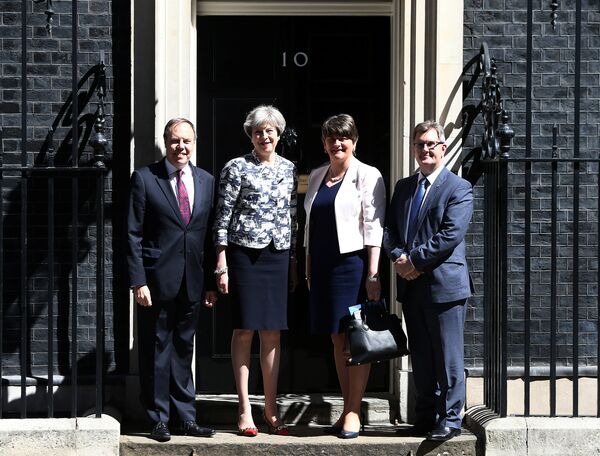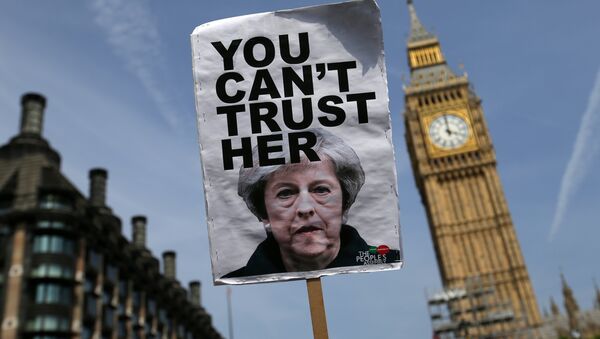It has even been suggested, albeit on a much smaller scale, that the Labour party should takeover, with Jeremy Corbyn assuming leadership of the UK.
"The election showed that, as we face the big challenges of our future, our country is divided: red versus blue; young versus old; leave versus remain. As I said here last week, the test for all of us is whether we choose to reflect divisions or help the country overcome them. With humility and resolve, this government will seek to do the latter," Theresa May said in June.
Although the Tories' deal with Northern Ireland's Democratic Unionist Party (DUP) has accentuated the contemporary anti-Tory hysteria, much of the backlash against them stems from their objective of controlling, reducing, and ultimately eradicating the UK's national debt, via austerity.

This is in stark contrast to the general tone of Labour's manifesto, which promised higher levels of spending on public services, and the scrapping of tuition fees. Certainly, this is a typical Labour stance, as they have traditionally opted for a "spend now, worry later" approach, which has, unsurprisingly, proved popular among the electorate, as voters are almost being bribed.
Although high levels of short-term government spending can win over voters and seats in the House of Commons, there is an expectation that parties must formulate their policies with the UK's long-term best interests in mind — there shouldn't be a trade-off between winning a term at number 10 Downing Street, and the robustness and stability of the UK's future economic position.
It's still almost certain that the abolishing of tuition fees would encourage more people to go to university, so the policy isn't meritless.
However, its source of funding is a cause for concern. Hiking the rate of corporation tax could cause disruption in the UK economy in various ways, some of which could directly be to the detriment of graduates; higher levels of taxation could rein in firm's ambitious growth plans, leading to lower levels of recruitment. Such a policy may be especially damaging to the UK, given the period of uncertainty caused by Brexit, with businesses exploring options outside the UK in some cases.
Although democracy is often peddled as a faultless system, it does have some imperfections, regardless of how well developed and finely-tuned a nation's democratic system and electoral process is.
"The best argument against democracy is a five-minute conversation with the average voter," former PM of the United Kingdom, Winston Churchill, famously said, suggesting that voters are often misinformed, and may strongly fixate on a trivial policy or incident when voting.
It can be argued that the ongoing wave of opposition to austerity adds weight to this argument, as it demonstrates that the electorate, who are ultimately the most powerful component in a perfectly functioning democratic system, are unlikely to always vote rationally and see the wider picture.
Nevertheless, democracy has prevailed throughout much of the world, due to lack of a better, more desirable alternative.
Emotive, viral and sometimes inaccurate campaigning can further confuse voters, and undermines the system. It should be noted that a lot of such material isn't officially produced, issued and circulated by the parties. This reduces the effectiveness and feasibility of regulation to tackle this issue.
Longer terms in office could encourage parties to adopt more long-term oriented policies, but this is likely to be met with some resistance, as it reduces the government's accountability to the general public.
In most conceivable scenarios, increasing the government's ability and incentive to legislate and govern without the pressure to quickly satisfy voters to maintain seats will invariably be accompanied by a fall in accountability — a core underpinning and principle that is required for democracy to successfully function.
Although the Conservative party performed worse than many had speculated prior to the election, they did receive the largest share of the votes, with a substantial amount of votes from working-class citizens, who, according to critics, would be better off voting for Labour.
It can even be argued that reducing our national debt needn't be prioritized or a core macroeconomic objective, as the UK has maintained high credit ratings, which provides it with access to cheap borrowing. Views on this matter are polarized, and vary widely between different economists and policy-makers.
The views expressed in this article are solely those of the author and do not necessarily reflect the official position of Sputnik.



